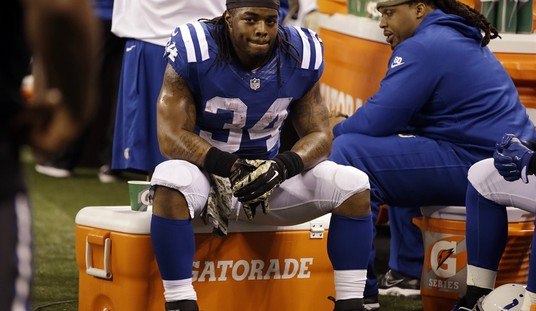Hard to disagree, even with only a few polls in the bank this week. Dean Heller has pulled even in Nevada, McSally is suddenly up in Arizona, Cruz’s lead is growing in Texas, Cramer and Blackburn look to be en route to easy wins in North Dakota and Tennessee, respectively. And it may get worse for Democrats: It’s been nine days since Indiana and Missouri were polled, 10 days since Florida was, and nearly three weeks since Montana was. All four of those races were tight even before the Kavanaughpocalypse. If Republicans have suddenly gained in each, they may be on their way to picking up multiple seats in November.
The Democrats’ last-minute Kavanaugh play, in other words, may be seen in time as a strategic blunder on par with the GOP’s impeachment of Clinton 20 years ago. Although of course that narrative will be deeply complicated if they clean up in House races in November, as they’re currently on track to do. The Kavanaugh war doesn’t seem to have backfired nationally on them, only in red states. But when all of the big Senate battles are being fought in red states, you … might want to take that into account before pulling something that might reasonably infuriate red-state voters.
And you know what? Maybe they did. Maybe Feinstein and Schumer were prepared to sit on Ford’s letter all the way through confirmation, fearing precisely this sort of midterm-motivating backlash on the right, until someone leaked it to the media and forced their hand. I doubt it, though. Whoever leaked it thought, I assume, that the uproar would force Kavanaugh to withdraw, the seat would stay vacant through Election Day, and the prospect of blocking a new nominee indefinitely would propel Democratic voters to stratospheric turnout, returning the Senate to Democratic hands. Oops.
Here’s new data from YouGov on how likely different demographic groups are to say that they’re more enthusiastic about voting this year than in previous years. The most enthusiastic group is Republican men. Proof positive of a “Kavanaugh effect”?

Poll after poll during the Kavanaugh confirmation battle showed a wide gender gap post-Ford. We may be saying that here with Republican men and women, too. Seems like a Kavanaugh effect! YouGov notes, though, that 40 percent or so of Americans don’t even know how their senators voted on Kavanaugh. And more Republicans name various other issues, like the economy and immigration, as important to their vote than say so of Kavanaugh’s confirmation. It’s complicated.
Rick Tyler raises an interesting possibility in the Scarborough clip below. Sure, anger at how Kavanaugh was treated has something to do with the GOP surge lately, but don’t overlook the fact that the confirmation battle was also a showcase for all sorts of Republican pols whom Trump-skeptic righties might find more to their tastes than POTUS. Trump made plenty of cameos during the post-Ford confirmation process but the last month may have been the single longest stretch of his presidency that he wasn’t dominating the Republican message every night. There was a lot of McConnell, a lot of Grassley, a lot of Lindsey Graham, and at the end a lot of Susan Collins. Everyone (except Murkowski) ended up holding hands for the nominee. The sense of unity and the experience of hearing from right-wing politicians who may speak to certain voters more effectively than Trump does might have boosted Republican enthusiasm more than simple anger at the Kavanaugh process did.
There are other reasons too. Don’t look now but Trump, a border superhawk, is holding his own with Hispanic voters:
While Trump was enacting his anti-immigrant agenda, Latino voters seemed to have slowly warmed up to the president. In last week’s NPR/PBS/Marist poll, 41 percent of Hispanics approved of Trump’s performance (black Americans? 12 percent). This is no outlier. Another recent poll put Trump’s approval among Latinos at 35 percent. An average of both would put Trump—again, an overtly nativist president—within about 10 points of Barack Obama’s 49 percent approval among Hispanic at roughly the same time in his presidency.
This does not mean Donald Trump is a popular president among Hispanics. He is not. But he is not repudiated, either, not by a mile. In a recent interview with Vox, University of Southern California professor Roberto Suro explained that while Latino voters “hold negative views toward Trump,” they do so “by a much smaller margin than Democrats overall.” Suro suggests that Latinos more closely resemble independent voters rather than “a steadfast Democratic constituency.” The polls, says Suro, also dispute “the presumption that Trump’s immigration policies have alienated large numbers of Latinos.”
A roaring economy will do that for you. If Hispanics were as enraged at Trump’s border policies as Democrats want them to be, and if they were channeling that anger by registering and turning out, all of the GOP fury over Kavanaugh might not be enough to save the Senate. Beto O’Rourke would stand a very realistic chance of knocking off Cruz for Texas’s Senate seat. As it is, Trump is north of 40 percent in job approval among Latinos and Cruz is winning nearly 40 percent of Latinos in Texas polls, good enough to give him a comfortable lead overall against his liberal challenger. The “Kavanaugh effect” is a nice storyline for Republicans with a lot of truth to it but all electoral coalitions are bigger than a single silver-bullet issue. If the GOP holds the Senate this fall via Texas and Florida and Arizona, better than expected performance with Latinos may have something to do with it.








Join the conversation as a VIP Member